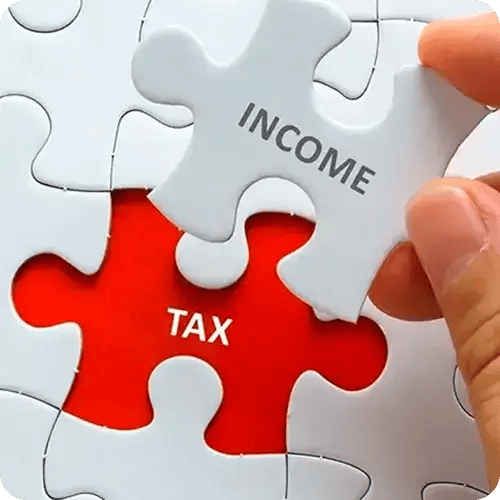Tax preparation & tax planning for individuals and global families
Individual Tax Services



Enjoy your success, we take care of your taxes
"The hardest thing in the world to understand is the income tax."
-Albert Einstein

Individual Tax Planning
Our expert tax advisors collaborate closely with you to design a personalized plan that minimizes tax liability and maximizes savings.
Customized Strategies: Address your unique financial goals and situation.
Proactive Guidance: Identify opportunities to reduce taxes today.

Individual Tax Preparation
Our CPA advisors provide accurate and stress-free tax preparation, ensuring compliance while maximizing deductions and credits.
Personalized Service: Tailored solutions for your unique tax situation.
Accurate Filing: Ensure all forms are completed correctly and on time.

IRS Audit Representation
Our tax professionals provide strong representation to navigate IRS audits, ensuring compliance and protecting your rights.
Authorized Representation: Trust our professionals to handle the IRS audit.
Expert Guidance: Avoid potential tax issues with proper representation.

Why H&CO Income Tax Services?
Our bilingual trusted Tax Advisors have been preparing federal tax returns and state tax returns for high-net-worth individuals, business owners, real estate investors, family offices, and international investors with complex tax needs, for over 30 years.
Effective tax planning and income tax preparation
services for individuals and global families
Who are our Income Tax Services for?
Our income tax preparation services cater to a diverse range of individuals seeking tax expert assistance in reducing taxes and safeguarding wealth. Our specialized offerings are tailored to meet the complex tax needs of customers:
Non-resident individuals
Americans living abroad - Expats
Business owners and executives
US real estate investors
International real estate investors
Founders and executives
Professional athletes
Income Tax Planning
Discover the benefits of tax planning and optimize your tax situation with our year-round income tax planning services. Our tax experts specialize in reducing your tax liability by leveraging tax deductions, tax credits, and strategic timing of income and expenses. Whether you're an individual, family, real estate investor, or small business owner, income tax planning should be a crucial aspect of your financial strategy. Don't feel overwhelmed by complex tax laws—we're here to guide you through the process. Minimize your income taxes by adopting income tax planning as a continuous and ongoing process. Explore our informative article for valuable tips on reducing your taxes.

High Net Worth Individual Accounting Services
Experience comprehensive high net worth individual accounting services tailored to protect and grow your wealth. Our Certified Public Accountants provide year-round accounting services, handling transaction processing, investment reporting, financial preparation, and personal income tax preparation. By outsourcing these accounting activities, you can focus on your business and investments. With our experienced CPAs, you'll receive personalized tax strategies that minimize tax liability, preserve wealth, and achieve long-term financial goals. Our individual accounting services also cover estate planning, family office support, retirement planning, and wealth management. We strive to provide peace of mind by offering accounting services for HNW individuals.

Income Tax Preparation Services
Enjoy a seamless and stress-free income tax preparation experience customized to meet your specific requirements. Our team of Tax Advisors and CPAs stay up to date on tax laws, maximizing deductions and tax credits to minimize your taxes or increase your tax refund. We understand each family’s unique tax situation and provide personalized tax preparation services for investors, families, and small businesses. With our year-round income tax preparation services, you can eliminate tax season stress by entrusting your individual income tax preparation to our CPAs. Don't let the complexities of tax laws overwhelm you—let us simplify the process and ensure accurate and timely filing using our AI-based tax preparation software.

International Tax Planning and International Tax Preparation
Our International Tax Planning and International Tax Preparation services provide comprehensive support for global families with operations and income in multiple countries. Our tax preparers understand the challenges of managing global tax effectively and staying current with international tax rules. Our services are designed to assist global families in fulfilling their international tax obligations while minimizing tax liability. We offer comprehensive tax planning and compliance support, including filing international tax returns, reporting global transactions, optimizing asset structures, and utilizing foreign tax credits. Our international tax professionals offer valuable insights on cross-border tax matters, helping you navigate the complexities of international tax laws.

Estate Tax Planning and Compliance
Our year-round estate tax planning and compliance services are designed to effectively minimize your future taxes, while maximizing the legacy you leave behind. We believe that estate tax planning is not a one-time event, but rather a continual process that involves ongoing communication. Our services are designed to ensure that your estate plan is up-to-date with the ever-changing estate tax laws. Our experienced estate tax advisors will work closely with you to identify your goals and aspirations, recommend tailored estate tax strategies, implement the plan, and monitor it over time. We ensure peace of mind by expertly handling and complying with all aspects of your estate tax affairs.

Gift Tax Planning and Compliance
Enhance your gift and estate tax planning with our comprehensive Gift Tax Planning and Compliance services. Our experienced gift tax advisors will work closely with you to develop tailored gifting strategies, ensuring compliance with gift tax regulations and optimizing the use of exemptions. By strategically utilizing annual exclusions and lifetime exemptions, you can effectively minimize your estate tax liability and safeguard your wealth. Don't let inadequate gift planning result in the loss of over 40% of your wealth at death. With H&CO's own technology and expert guidance, you can proactively protect your assets and confidently pass on your legacy to future generations.

Charitable Tax Planning and Compliance
Maximize your charitable impact and optimize your benefits with our expert charitable tax planning services. H&CO offers comprehensive solutions for affluent families, including detailed charitable plans tailored to your specific goals. Our team considers the latest tax laws and legislative changes to ensure your giving strategy aligns with your estate and income tax planning. We guide you in determining the ideal timing and assets for donations, helping you make a positive philanthropic impact while reducing your tax burden. Trust H&CO to create a strategic charitable giving plan that integrates seamlessly with your financial goals.

Family Office Tax Services
Family offices play a crucial role in managing and preserving family wealth across multiple generations. Our family office tax experts serve as knowledgeable partners, ensuring minimized tax liability and adherence to tax codes. With our comprehensive Family Office Tax & Accounting Services, we provide extensive support in designing and implementing family offices. From tax planning, outsourced accounting, and tax preparation to entity restructuring, we offer a wide range of assistance. Understanding that each family has unique needs, we work closely with family offices, delivering personalized and tailored services. Trust H&CO as your dedicated family office partner to navigate complex tax landscapes and safeguard your family's wealth.

Real Estate Tax Planning and Preparation
Our specialized real estate tax services cater to the unique needs of real estate investors, developers, funds, operators, and realtors. Benefit from our comprehensive Real Estate Tax Planning and Real Estate Tax Preparation services covering assistance with real estate acquisitions, due diligence, structuring, real estate accounting, cost segregation, and real estate tax return preparation. Our expertise extends to property disposition, including free 1031 exchanges. We not only work with thousands of real estate investors from all over the world, but we also invest in real estate ourselves. Maximize your real estate ventures with H&CO's tailored solutions and in-depth knowledge of the real estate industry and its tax implications.

IRS Tax Audit Representation Services
Rely on H&CO's Tax Audit Representation Services to effortlessly navigate the government audit process. Our team of professionals, including Certified Public Accountants (CPAs), possesses the knowledge and expertise to effectively handle your IRS audit, ensuring compliance and protecting your rights. With our strong representation, you can have peace of mind throughout the audit process. Don't face the IRS alone, as improper representation can lead to trouble. Even if you feel confident in handling the process, it is highly recommended to have professional representation. Trust H&CO to provide expert guidance and protection throughout your tax audit, ensuring a seamless experience.

-
Income tax planning
-
High Net Worth Individual Accounting Services
-
Income Tax Preparation Services
-
International Tax Planning and International Tax Preparation
-
Estate Tax Planning and Compliance
-
Gift Tax Planning and Compliance
-
Charitable Tax Planning and Compliance
-
Family Office Tax Services
-
Real Estate Tax Planning and Real Estate Tax Preparation
-
IRS Tax Audit Representation Services

We're the complete tax service solution
Our Individual Tax Services:
We offer comprehensive taxation services that go beyond basic tax preparation and filing your taxes online. Our experienced tax professionals provide full service and comprehensive services from income planning, tax preparation, to IRS representation, and ensure the accuracy of your federal and state income tax returns. Trust H&CO for reliable and guaranteed tax assistance.
Common Tax Questions
-
What is income tax?
Income tax is a government-imposed tax on the earnings of individuals and businesses. It is typically calculated based on the income or profits generated within a specific period. Individuals and businesses are required to report their income and pay a percentage of it as income tax to the government. -
What are the states with no income tax?
There are currently seven states in the United States with no income tax on individuals: Alaska, Florida, Nevada, South Dakota, Texas, Washington, and Wyoming. -
Does Florida have state income tax?
Florida does not impose a state income tax on individuals. It is one of the seven states in the United States that does not levy a personal income tax. -
What is the difference between a CPA and a tax preparer?
A Certified Public Accountant (CPA) is a state board-licensed professional with advanced education and training in all areas of accounting and tax laws. A tax preparer is a non-licensed accountant who prepares and files income tax returns of clients for a fee. Most CPAs must obtain a master’s degree and pass the CPA exam to test their knowledge in accounting, audit, technology and tax. -
What will I pay for tax preparation services?
Tax preparation fees vary depending on the complexity of your return, the tax service provider, and the additional services required. As a CPA firm, we charge a minimum of $1,000 for a simple federal income tax return such as 1040 EZ or 1040 A. For more complex income tax returns (such as those with multiple states, investments, small businesses, etc.), we charge a minimum of $7,500. In general, the cost of preparing your personal income tax return will vary depending on the complexity of your situation. -
How can I reduce my income taxes?
Tax planning is the key to lowering your tax bill. To reduce your income taxes, explore tax deductions, tax credits, and tax-saving strategies available to you. You can take advantage of tax deductions such as medical, mortgage interest, real estate taxes, and other tax deductions. You should also maximize your tax credits such as the earned income tax credit, child tax credit, dependent tax credit, and other tax credits. And don’t forget your retirement plans like 401(k) plans, traditional IRAs, Roth IRAs, defined benefit plans, and other similar plans. -
What is the federal income tax rate?
The federal income tax rates in the United States are progressive, which means they increase as income rises. Currently, there are seven federal tax brackets to compute your income tax: 10 percent, 12 percent, 22 percent, 24 percent, 32 percent, 35 percent, and 37 percent. Your federal tax bracket is the rate you pay on the "last dollar" you earn. -
Income Tax Calculator
An income tax calculator is a valuable tool that helps you estimate your tax liability, potential refunds, and plan for the upcoming tax season. By inputting your financial information, such as taxable income, your filing status, deductions, and credits, an income tax calculator can provide you with an accurate estimate of how much you may owe or receive as a refund. We recommend the following income tax calculator: https://www.calculator.net/tax-calculator.html
Simplify Your Taxes with Expert Individual Tax Services!
Partner with us for seamless tax management today!



